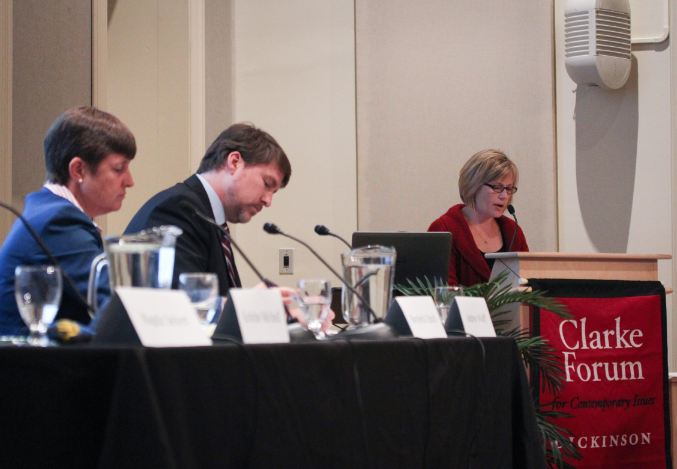Clarke Forum Tackles Syrian Civil War
Panelists assess American policies in the Middle East
Professors Andrew Wolff and Marybeth Ulrich look over their remarks as Professor Kristine Mitchell presents her view on the refugee crisis in Europe and the United States caused by the civil war in Syria.
The Syrian civil war is the largest refugee crisis since the Rwandan Genocide, and has been said to rival the domestic and international complexities of the Balkans crisis. The intricacies of the conflict formed the discussion topic at a Breaking Issue panel hosted by the Clarke Forum for Contemporary Issues on Monday Oct. 26.
Moderated by Andrew Wolff, assistant professor of Political Science and International Studies, three panelists – Kristine Mitchell, associate professor of Political Science and International Studies, Magda Siekert, lecturer of the Middle East Studies department and Professor Marybeth Ulrich, adjunct faculty in Political Science and International Studies – discussed the crises at hand, the failings in the international response, and the ways in which the international community can do better. More than 200 audience members were in attendance.
The panelists agreed that there are two issues that need to be addressed in resolving the crisis: the stabilization of the Syrian region and the accommodation of the hundreds of thousands of migrants streaming into Europe.
Siekert believes that coordinating the stabilization of the region is the United States’ responsibility, stating, “the U.S. always plays a leadership role, for better or for worse.” Speaking of America’s current involvement, she claimed that “we’re losing: we’re losing prestige, we’re losing on all fronts.” She pointed to the example of the CIA’s rebel training program that spent 500 million dollars but produced only five active fighters in Syria.
Siekert explained that the way to stop the fighting is to cut off each side’s life-lines, because “both sides will continue believing they can win, and continue fighting, as long as they have a country backing them.” The rebel forces are backed by the U.S., the United Arab Emirates and Saudi Arabia, while Russia and Iran support Assad.
“The way to Assad’s will is through Russia and Iran,” said Siekert, advocating for better negotiation between the U.S., Russia, and Iran. “One thing is clear, the longer we delay a political settlement, the more entrenched and extreme the positions of the parties involved become.”
Ulrich agreed that sustained dialogue is necessary between the U.S., Russia and Iran because “the Russians and Iranians hold the leverage.” She proposed that Europe and the U.S. use their sanctions, imposed on Russia in response to the Ukrainian crisis, as leverage to bring Russia, and as a result Assad, to the negotiating table.
She said that Russia is merely trying to gain international prestige through the Syrian conflict, and “is not looking for a sustained conflict.” Consequently, Ulrich claimed, the offer of alleviating sanctions is a persuasive one because the sanctions, along with the drop in oil prices, have had a devastating affect on Russia’s economy.
Mitchell claimed the European Union is also failing in their dealings with the migrant crisis within Europe. She refers to EU nations closing borders and erecting fences in an attempt to keep refugees out. She said that “every state is doing what’s good for itself, shifting the burden onto their neighbors.”
Mitchell described “the political and public opinion perception [as] ‘we have no resources to give’” due to the Euro crisis. However she believes “that is a poor response,” citing the high per-capita GDP of EU nations versus the low per-capita GDP of nations on Syria’s borders dealing with the bulk of the refugees. She went on to say “the EU needs to find a European wide mechanism to solve this issue” in order to prevent uneven burden sharing.
All the panelists agree that the issue is extremely complicated, and that the international community is failing; however they do believe there is an end in sight.
“I am optimistic only if I look at the news from last week” Siekert says, referring to a vocalization from both Russia and the U.S. wishing to end this crisis politically.






